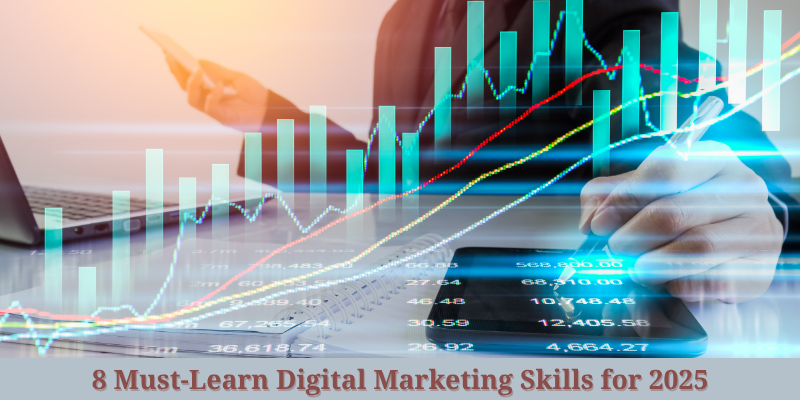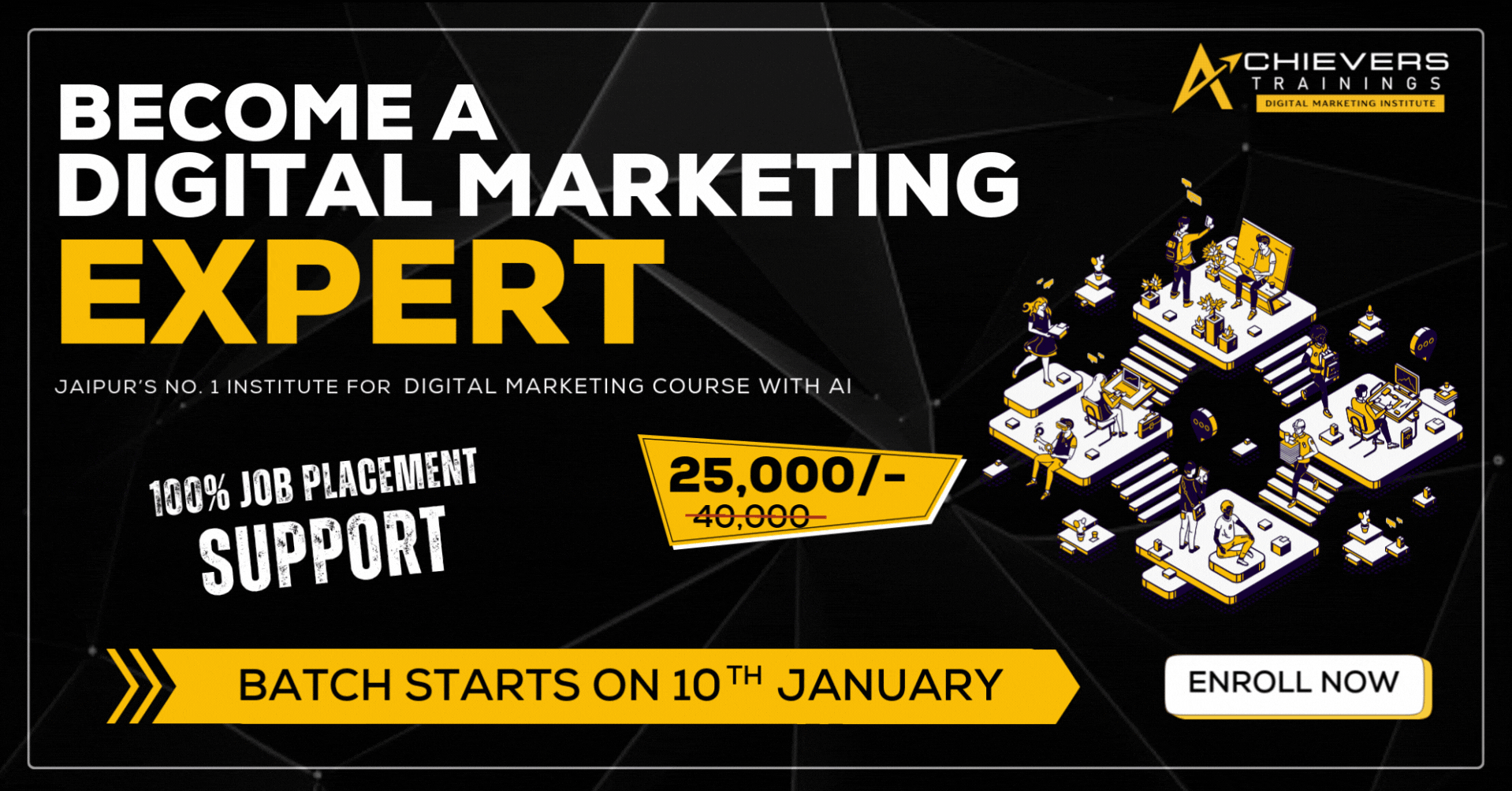In today's fast-evolving digital landscape, marketing professionals must continuously adapt to new trends, technologies, and tools. Digital marketing is dynamic, and staying ahead of the curve is crucial to success. Whether you're a seasoned marketer or just entering the field, mastering the essential digital marketing skills for 2025 will give you the edge you need to thrive in this competitive space.
In this post, we will discuss 8 essential digital marketing skills you need to master to remain competitive in 2025. These skills will not only help you in your current role but also make you a valuable asset to any business or organization.
Video Marketing: Connecting with Audiences in 2025
Video marketing is one of the most powerful tools for digital marketers in 2025. With the continuous rise of visual platforms like TikTok, Instagram, and YouTube, video content has become the primary method for brands to engage with their audiences. According to a recent study by HubSpot, 93% of marketers say that video has helped them increase brand awareness, drive more traffic, and improve their ROI.
Video is incredibly effective because it provides a more personal and engaging experience for viewers. It builds trust and emotional connections in ways that written content cannot. Think about it: people are more likely to trust a brand when they see real people sharing authentic experiences. It's an opportunity for brands to tell their stories, show behind-the-scenes content, and connect on a deeper level with their audience.
Types of Video Content to Explore:
- Explainer Videos: These are short, concise videos that explain a product or service in an easy-to-understand way. For example, a software company could create a quick explainer video that demonstrates how their tool saves time or boosts productivity.
- Social Media Videos: These short, engaging videos work wonders on platforms like Instagram and TikTok. Social media videos are typically fast-paced, with attention-grabbing visuals and concise messaging.
- Testimonial Videos: Customers sharing their positive experiences with a brand can be a powerful form of social proof. These videos not only build credibility but also show potential customers that others trust your brand.
Why is Video Marketing Important in 2025?
The ability to create high-quality videos has never been more accessible. With tools like Camtasia, CapCut, and even your smartphone, you can produce professional-looking videos without the need for expensive equipment. This democratization of video creation means more brands will have the opportunity to connect with their audience in an impactful way.
Video marketing is one of the top digital marketing trends for 2025, and learning how to leverage it effectively will be crucial for marketers. From live streams to short TikTok videos, the possibilities are endless.
SEO & SEM: Increasing Your Brand's Visibility
One of the most fundamental skills in digital marketing is Search Engine Optimization (SEO). SEO is the practice of optimizing your website and content so that it ranks higher on search engine results pages (SERPs). This process is key to driving organic traffic to your site and increasing visibility. SEO strategies include optimizing your website's structure, creating high-quality content, and gaining backlinks from reputable sites.
Along with SEO, Search Engine Marketing (SEM) encompasses both organic (SEO) and paid search strategies, like Pay-Per-Click (PPC) ads. SEM is an effective way to increase your site's visibility and drive more targeted traffic, especially when combined with SEO.
Key SEO Techniques to Focus On:
- Keyword Research: Identifying the terms your audience is searching for is critical. Use tools like Google Keyword Planner or SEMrush to find relevant keywords and integrate them into your content.
- On-Page Optimization: This includes title tags, meta descriptions, and header tags. Every page of your website should be optimized to improve its chances of ranking higher.
- Link Building: Building high-quality backlinks from reputable websites remains one of the most important ranking factors in Google's algorithm.
- User Experience (UX): A website with good UX not only improves user satisfaction but also helps SEO. Google rewards sites that load quickly are mobile-friendly and have intuitive navigation.
Voice Search and AI's Impact on SEO:
As voice search continues to rise, marketers need to optimize for voice queries. Voice searches tend to
Don't miss your chance to enroll now.🚀 New Batch Starting Soon!
In addition, AI is increasingly influencing how search engines rank websites. Google's algorithms are constantly evolving, and staying updated on AI-driven SEO strategies will give you a competitive advantage.
Content Marketing: Creating Value-Driven Campaigns
Content marketing remains the heart of every successful digital marketing campaign. It's how you build relationships with your audience, share your brand message, and establish your brand as an industry authority. Whether it's through blog posts, social media updates, or videos, content marketing enables you to connect with your audience on a deeper level.
In 2025, the most effective content marketers will be those who create content that is valuable, authentic, and aligned with their audience's needs. Using content pillars—core topics around which you structure your content strategy—will help you stay focused and organized.
Types of Content to Consider:
- Blog Posts: Long-form content is valuable for SEO and for educating your audience. Comprehensive, detailed posts that address specific topics will continue to rank well in search engines.
- Social Media Posts: Short, engaging, and shareable posts help brands stay connected with their audience daily. Visual content, including infographics and memes, is particularly effective.
- E-books and Whitepapers: In-depth guides and downloadable content are excellent for generating leads. They provide value to your audience while capturing their information for future nurturing.
How AI and Automation Are Enhancing Content Marketing:
AI tools like ChatGPT and Copy.ai can assist with generating content ideas, writing drafts, and even optimizing content for SEO. However, it's important to remember that AI-generated content still needs to be reviewed and tailored by humans to ensure it aligns with your brand voice and provides true value to your audience.
Content marketing is evolving to become more data-driven, with marketers leveraging AI to improve personalization and targeting.
Data & Analytics: Making Informed Decisions
In digital marketing, data is invaluable. Marketers must be able to collect, analyze, and draw actionable insights from data to improve their strategies. Google Analytics is one of the most popular tools for tracking website performance, but to truly succeed, you need to know what metrics to focus on and how to interpret them.
Key Data Points to Track:
- Traffic Sources: Understanding where your website visitors are coming from—whether organic search, social media, or paid ads—can help you determine which channels are working best.
- Conversion Rates: Knowing how many visitors are completing the desired actions (e.g., signing up for a newsletter and making a purchase) allows you to optimize your conversion funnel.
- Customer Behavior: Tracking how users navigate your website provides insights into friction points that need improvement.
Using advanced tools like Hotjar for heatmaps and Google Optimize for A/B testing can provide deeper insights into user behaviour and help marketers fine-tune their campaigns.
AI & Automation: Streamlining Your Efforts
As AI continues to evolve, it's reshaping the way marketers approach their work. AI can automate many marketing tasks, from data analysis to content creation, improving efficiency and accuracy. Automated systems can also help personalize marketing efforts at scale.
Examples of AI in Marketing:
- Chatbots: AI-powered chatbots can provide instant customer support on your website or social media, improving user satisfaction and reducing workload.
- Predictive Analytics: AI can analyze historical data and predict future trends, allowing marketers to create more personalized campaigns and optimize ROI.
- Automated Emails: Email marketing tools like HubSpot, Mailchimp, and Omnisend allow marketers to send personalized, automated messages based on user behaviour.
AI and automation help marketers deliver better, more personalized experiences while saving time and resources. Understanding how to incorporate these technologies into your campaigns will help you stay competitive in 2025.
Design Thinking: Crafting User-Centered Campaigns
Design thinking is an approach that focuses on understanding the needs and experiences of users when creating campaigns or digital experiences. It emphasizes empathy and user-centred design, which is essential in today's competitive market.
How Design Thinking Improves Marketing:
- Focuses on User Needs: By understanding your audience's pain points and desires, you can create campaigns that speak directly to them.
- Improves Campaign Effectiveness: Campaigns that are designed with the user in mind tend to be more engaging and result in better conversion rates.
- Brand Consistency: Design thinking ensures your marketing materials are visually cohesive, which strengthens brand recognition.
In 2025, marketers who incorporate design thinking into their campaigns will be better equipped to create meaningful experiences that resonate with their audience.
Social Media Marketing: Engaging Your Audience
Social media remains one of the most powerful tools for marketers. With over 5.3 billion people using social media worldwide, it's a critical platform for building brand awareness, engaging with customers, and driving conversions.
Key Platforms to Focus On:
- TikTok: Perfect for younger audiences and short-form, highly creative videos.
- Instagram: Great for visually-driven content, including stories, reels, and posts.
- LinkedIn: A must for B2B marketing and professional networking.
- Facebook: Still one of the largest platforms for both B2C and B2B marketing.
Each platform has its own audience and content preferences. In 2025, understanding the unique culture of each platform and crafting platform-specific content will be crucial to success.
Email Marketing: Building Lasting Relationships
Despite the rise of social media, email marketing remains one of the most effective channels for direct communication with your audience. Marketers who utilize email to nurture relationships with leads and customers see a high ROI.
Best Practices for Email Marketing:
- Segmentation: Divide your email list into different segments based on demographics or behaviour. Tailored emails will result in higher engagement.
- Personalization: Use the recipient's name, personalize the content, and send targeted offers based on their previous interactions with your brand.
- Automation: Tools like HubSpot and Mailchimp make it easy to automate email sequences, ensuring timely and relevant communication with your audience.
Email marketing helps build relationships and keeps your brand top-of-mind. By mastering it, you can drive more conversions and retain loyal customers.
Conclusion: Stay Ahead of the Curve in Digital Marketing
Digital marketing in 2025 will be more dynamic and data-driven than ever before. The key to staying competitive is continually learning and adapting to new tools and trends. By mastering these 8 essential digital marketing skills, you'll be well-equipped to tackle new challenges, create innovative campaigns, and drive measurable results for your business.
Embrace the future by experimenting with new techniques, staying updated on industry changes, and refining your strategies to stay ahead of the curve. The world of digital marketing is rapidly evolving, and those who are equipped with the right skills will be the ones who succeed.



